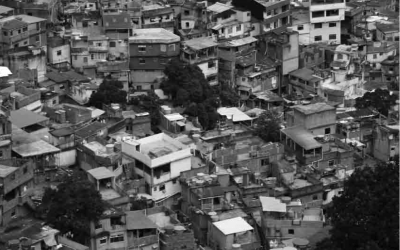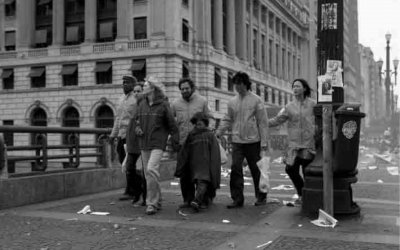Edifício Master: One View
Some movies seem to travel better than others. From the point of view of teaching a class on Brazilian cinema in a U.S. university to students with a wide range of backgrounds, it is never clear how they will interpret the tone of a scene or what jokes and references will get lost in translation. In the case of Eduardo Coutinho’s Edifício Master (2002), it was as if certain students had seen a different film altogether. The documentary consists of interviews with the residents of crowded building in Copacabana: middle-aged couples, a prostitute, and a former soccer player, among others, tell their stories, dreams, and frustrations. Coutinho is one of those rare directors able to treat his subjects as neither heroes nor villains: he does not look at them from above or below, aware that his cameras can only capture the truth of a person’s reaction to being filmed.
Edifício Master, then refrains from editorial judgments, even when we discover holes in a story, or have enough reason to suspect embellishments. The only soundtrack is provided by singing, which Coutinho tends to encourage his interviewees to do. Yet to a fraction of my class, the film was sensationalist and exploitative. Having seen it several times and being familiar with the critical reception, I was surprised by their response. The lesson plan was tossed, students spent over an hour arguing the point back and forth, and I do not think I have learned so much in a classroom as I did then. I saw the movie again, as someone who had never spent time in Brazil or Latin America. Perhaps people do not open up so easily to a stranger elsewhere, unless prodded by the promise of appearing on television? A believer in the universal appeal of Coutinho’s documentaries, I had to concede there can be such a thing as culture shock.
Fall 2009, Volume VIII, Number 3
Bruno Carvalho received his Ph.D. in Romance Languages and Literatures from Harvard University. He is an assistant professor at Princeton’s Department of Spanish and Portuguese Languages and Cultures.
Related Articles
Coconut Milk in Coca Cola Bottles
Common knowledge has it that virtually any movie, once removed from its original cultural context of production and reception, might be either misunderstood and misperceived or re-interpreted and re-signified. Likewise, we may agree that national cinemas seek to define, challenge….
Neither the Sertão or the Favela
To frame the poetics of the ordinary in terms of subtlety and delicateness is to propose an antidote both for cynicism and for what I call Neo-Naturalism. Its appearance, at least in Brazilian cinema and literature, has been clearly identified, ranging from peripheral subjects…
Brazilian Cinema Now
Snow falling in the city of São Paulo, in southern Brazil? Taking a helicopter in São Paulo then arriving a few moments later in the deep wilderness of the Amazon jungle, half a continent further away to the north? Then meeting a white Asian tiger in the heart of the Amazon forest?…




